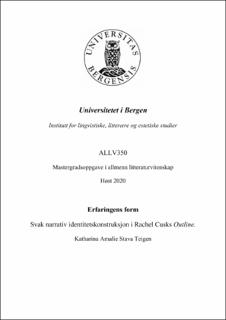Erfaringens form: Svak narrativ identitetskonstruksjon i Rachel Cusks Outline.
Master thesis
Permanent lenke
https://hdl.handle.net/11250/2723331Utgivelsesdato
2021-01-16Metadata
Vis full innførselSamlinger
- Master theses [237]
Sammendrag
This thesis explores the relationship between personal identity and literary form in Canadian-British Rachel Cusk’s novel Outline and in her autobiographical memoirs about motherhood and divorce, A Life’s Work and Aftermath. Part of the main argument in the thesis is that the title of the novel – Outline – is a metafictional reference to a meta-autobiographical form of narrative identity construction that stands out as a creative alternative to more conventional narrative identity constructions of the kinds that are normally associated with the form of the traditional, Western autobiography. This alternative narrative form is investigated in relation to Cusk’s published poetics about a female form of literature and Brian McHale and Pekka Tammi’s notion of weak narrativity. The novel Outline’s weak narrative form inaugurates a structure for experimentally probing into and attaining new self-knowledge in a manner which is clearly attentive to the liminal and ambivalent experience of living in a female body. However, while topics and devices explored in Outline in this respect resonate with and are shared in Cusk's autobiographical memoirs, yet the unique narrative form developed in the novel fundamentally appears as a structure for self-knowledge open to both genders. The close link between the exploration of female experience through literary form in Cusk’s memoirs and Outline’s novelistic literary form thus leads to an ontological universalization of femininity in Outline, all of which makes Cusk’s expressed poetics about a female literary form appear as the materialization of a form for human experience – for humanity. In the perspective of the thesis, human search for existential insight into experience, and especially its thrust for a better and more productive knowledge of the self and identity, in Outline openly pays heed to and welcomes hitherto unknown parts of the self – also those immersed in darkness and which might never be fully known, yet that regardless constitute the “groundless ground” of the self.
